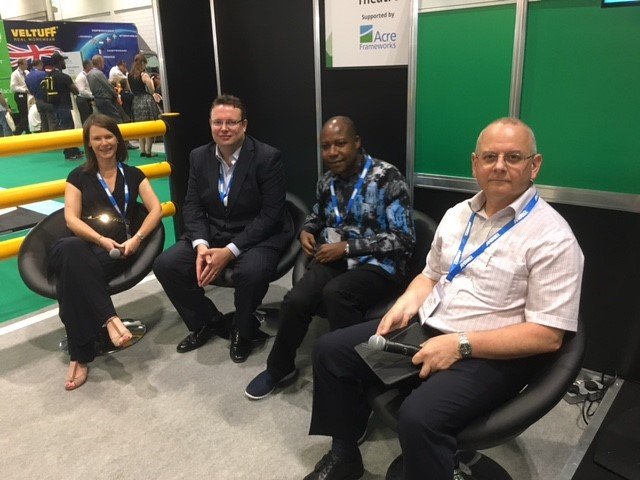Safety & Health Expo debate: International approaches to H&S
Kicking off Safety & Health Expo 2017 was a fantastic Barbour Debate looking at international approaches to health and safety. Speakers included Gareth Davies, Head of Health, Safety & Environment at Nokia, Olawale Ogunyebi, Former Safety Operations Manager at Unilever, Mike Taylor, Associate Director at Turner Townsend and Katie Vickery, Partner at Osborne Clarke LLP, who explored the differences and similarities with health and safety in different countries within Africa, UK and EMEA.
Opening the debate, the panel discussed the challenges for health and safety around the world. Katie Vickery began by saying that while countries may seem very different in relation to occupational safety and health, they are also very similar, adding that the more you start exploring other countries, the more interesting ideas you see.

Perceived risk and culture
In response Gareth Davies said that companies that work globally need to consider their minimum principles, before looking at local legislation. “Often it is not just about differences in legislation but differences in the way the legislation is perceived”, he continued.
“For example Ghana may have a laid back approach – and that may give you challenges on deadlines. In India, it may be the opposite, and workers may be trying to do three days’ work in one. You need to understand the culture and understand the mind-set.”
You need to work out what your minimum expectations are – start with that before you look at legal complexities. – Gareth Davies
Mike Taylor agreed, adding: “It is key to understand the concept of risk. In some countries people are ‘happy to be alive today and take tomorrow as it comes’ it’s not just about the way legislation is implemented, but about the culture.”
On culture Olawale Ogunyebi said: “In Africa – religious and cultural belief has a huge impact on risk perception. You may warn a driver to reduce his speed and response may simply be ‘whatever will happen will happen’”.
Enforcement
Olawale said that in Africa the biggest challenge currently is enforcement.
On the topic of enforcement Mike Taylor added: “In some countries there may not be one single unified body looking at enforcement. All of the legislation I’ve seen around the world has similar concepts but it is how they are picked up and applied by the labour inspectorates around the world that differs.”
On enforcement Gareth added: “It’s not just whether there is enforcement it’s also the transparency and honesty – which is so important for learning. In Japan and china, for example, auditing almost offends people. To find something in an audit is an opportunity to learn not something anyone should be offended by.”

Differences and similarities
Exploring how different countries deal with occupational health and safety Mike added: “On a national level governments can make knee jerk reactions, being reactive rather than proactive. More companies are holding people, not just the corporation, accountable and going with the concept of putting responsibility with an individual.”
On the same topic Katie added: “In the UK we are used to the corporate and individual prosecutions. As an OSH professional, this can be a helpful tool to get buy in and get engagement.”
On the USA, Gareth said there has been a real shift, and the mind-set has started to change, with corporate customers taking responsibility: “a few years ago it was very different, there was a shifting of the blame.”
Katie explored the South Korea ferry disaster and recognised how dramatically that incident changed the culture in the country. “The country is on a journey” she said.
Mike Taylor discussed Germany and its “very prescriptive and focused” nature, asking “How as an organisation do you cope with that?”.
“In some countries it’s more focussed on fixed figure compensation” he continued: “there are vastly different systems to manage personal injury and personal injury claims.”
Emerging trends
On emerging trends the board all discussed mental health, wellbeing, security, and online capability.
Issues like fatigue and how it affects the worker’s ability to do their job safely will be big over the next ten years, they agreed.
Safety & Health Expo debate: International approaches to H&S
Kicking off Safety & Health Expo 2017 was a fantastic Barbour Debate looking at international approaches to health and safety.
Lauren Applebey
SHP - Health and Safety News, Legislation, PPE, CPD and Resources Related Topics
See Barbour EHS, William Martin Compliance and Elogbooks at Facilities Show 2022
The key drivers of bullying and incivility at work
HSE research provides new insight into asbestos exposures to licensed removal workers


